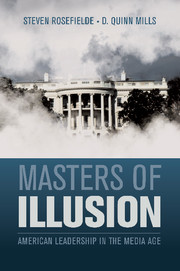Book contents
- Frontmatter
- Contents
- List of Tables and Figures
- Preface
- Acronyms
- Executive Summary
- Acknowledgments
- PART I NATIONAL SECURITY IN THE NEW AGE
- PART II AMERICAN PUBLIC CULTURE AND THE WORLD
- PART III AMERICAN PUBLIC CULTURE AND OURSELVES
- PART IV THE RECONFIGURATION OF NATIONAL WEALTH AND POWER
- PART V VORTEXES OF DANGER
- PART VI THE AMERICAN RESPONSE
- PART VII LEADING TOWARD PEACE
- PART VIII AMERICAN PRESIDENTIAL LEADERSHIP
- Notes
- Glossary
- Bibliography
- Index
PART VIII - AMERICAN PRESIDENTIAL LEADERSHIP
Published online by Cambridge University Press: 31 July 2009
- Frontmatter
- Contents
- List of Tables and Figures
- Preface
- Acronyms
- Executive Summary
- Acknowledgments
- PART I NATIONAL SECURITY IN THE NEW AGE
- PART II AMERICAN PUBLIC CULTURE AND THE WORLD
- PART III AMERICAN PUBLIC CULTURE AND OURSELVES
- PART IV THE RECONFIGURATION OF NATIONAL WEALTH AND POWER
- PART V VORTEXES OF DANGER
- PART VI THE AMERICAN RESPONSE
- PART VII LEADING TOWARD PEACE
- PART VIII AMERICAN PRESIDENTIAL LEADERSHIP
- Notes
- Glossary
- Bibliography
- Index
Summary
Why does America do international relations so clumsily, and why are we so unpredictable? When other countries expect us to act as a dominant power, we oftentimes don't – confusing them and risking conflict. In part the answer is that our presidents are captured by our public culture, and so fail to make proper decisions. They are captured either because they believe the tenets of the public culture, or because they are such weak leaders that, though they know it is full of illusions, they flee to the shelter of the public culture to try to raise support for their policies. In addition, America is first and foremost concerned with domestic politics and neglects international relations, so that we chose presidents ill-prepared for international responsibilities. Finally, we vest in our presidents both leadership and managerial responsibilities, and rarely do we chose as president a person who can do both. Thus, we don't select presidents who are prepared for the challenges of leading a great power in the world – who are able to master the illusions of our people. We are “ … a great imperium with the outlook of a great emporium,” in Victoria DeGrazia's phrase, and never more so than today, with our first president who has been trained as an MBA.
- Type
- Chapter
- Information
- Masters of IllusionAmerican Leadership in the Media Age, pp. 403 - 404Publisher: Cambridge University PressPrint publication year: 2006



